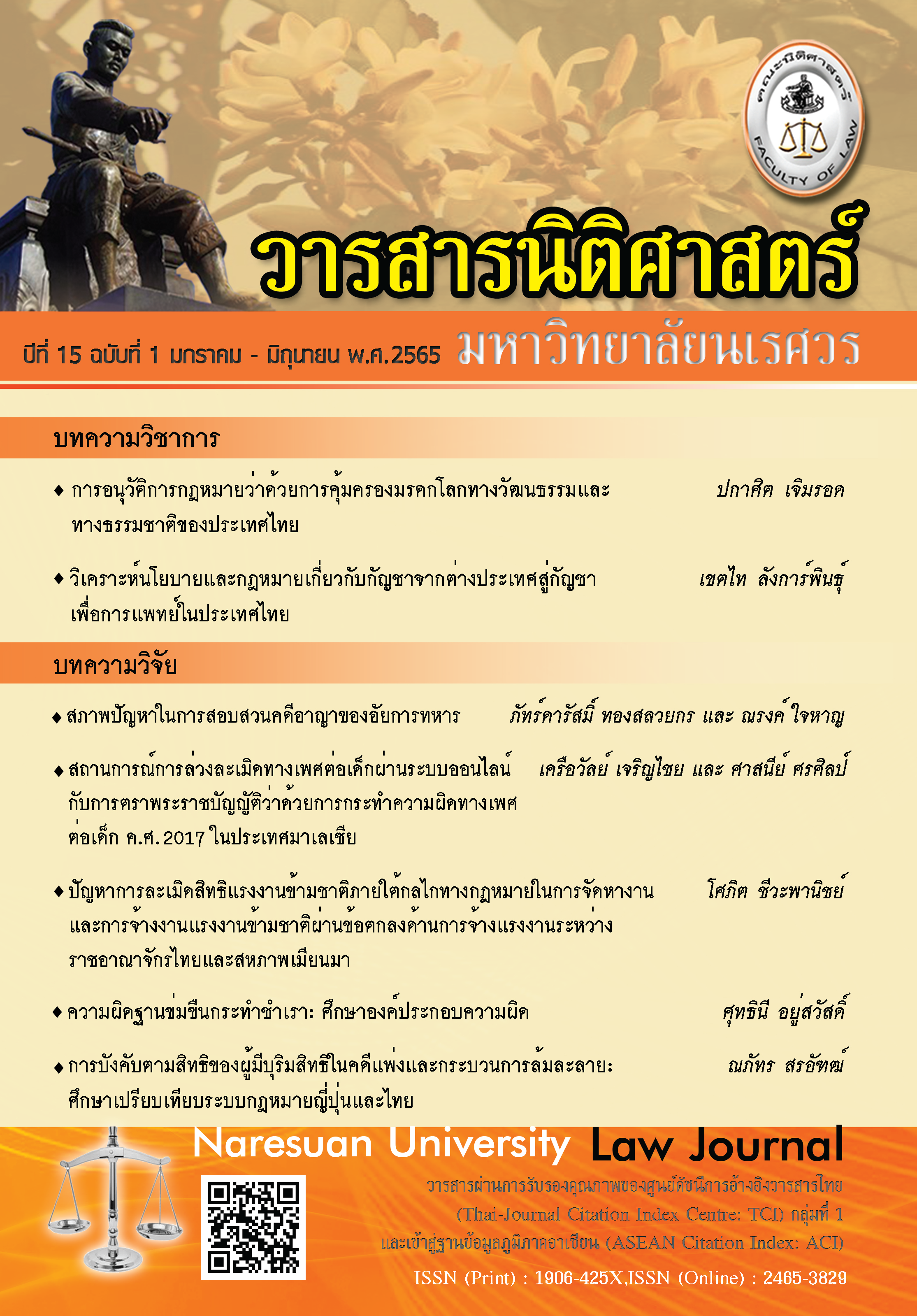Problems Relating to the Violation of the Migrant Workers’ Rights under Legal Mechanism in the Recruitment and Employment of Migrant Workers through Memorandum of Understanding between the Government of the Kingdom of Thailand and the Government of the Union of Myanmar on Cooperation in the Employment of Workers
Main Article Content
Abstract
This research aims to study problems of legal mechanism for the protection of workers’ rights and the fair recruitment and employment of workers under the agreement between Thailand and Myanmar and recommend the solutions thereof. This research is based on documentary analysis and in-depth interview with relevant stakeholders. The research found that most of the policy and laws of Thailand were in line with the international standards. Problems remained at the law enforcement of certain issues as the high cost of fee and expenses in the recruitment process, the seizure or keeping the personal documents of the workers by the employers, the limited conditions to change the employers and the termination of contract, the access to the complaint mechanism and the access to benefits in the social security and the workmen’s compensation funds. The research outcomes led to the recommendations for the government as follows: Firstly, negotiate for the additional clauses in the MOU on the fee and cost in the recruitment process and the conditions for the change of employer. Secondly, make clear guidelines on wage and debt deduction and revise the practice of keeping the workers’ personal documents by the employers. Thirdly, revise law on the change of the employers not to be based on the wrongdoing of either the employer or the worker. Fourthly, improve the complaint procedures and develop the referral system to reduce the burden of the
employers and workers. Fifthly, improve the access to the benefits under the social security and the workmen’s compensation funds for migrant workers to be able to receive those benefits the same as Thai counterparts.
Article Details
References
Asian Development Bank. Building Partnerships for Effectively Managing Labor Migration: Lessons from Asian Countries. N.p.: Asian Development Bank, 2019. Accessed November 26, 2021. https://www.oecd.org/migration/mig/ADBI-Labor-Migration-2019.pdf.
Charamporn Holamyong and Sureeporn Punpueng. “Migrant Workers in Thailand: Things Thais Must Have Known.” In Thai Tang Daow Thaow Tang Dan: Sociology of Life Cross Border, edited by Pattaya Ruenkaew, Supang Chantavanich and Chantana Banpasirichote Wankaew, 149-152. Bangkok: Chulalongkorn University Press, 2016. [In Thai]
Commissioner for Human Rights. Migration, Human Rights and Governance. Geneva: Inter-Parliamentary Union, 2015. Accessed November 26, 2021. https://www.ohchr.org/documents/publications/migrationhr_and_governance_hr_pub_15_3_en.pdf.
Department of State, the United State of America. Trafficking in Person Report 2021. Washington, D.C: Department of State, the United State of America, 2021. Accessed November 26, 2021. https://reliefweb.int/sites/reliefweb.int/files/resources/TIP_Report_Final_20210701.pdf.
International Labour Organization. General Principles and Operational Guidelines for Fair Recruitment and Definition of Recruitment Fees and Related Costs. Geneva: International Labour Organization, 2019. Accessed November 26, 2021. https://www.ilo.org/wcmsp5/groups/public/---ed_protect/---protrav/---migrant/documents/publication/wcms_536755.pdf.
International Labour Organization. ILO Multilateral Framework on Labour Migration: Non-Binding Principles and Guidelines for a Rights-Based Approach to Labour Migration. Geneva, International Labour Organization, 2006. Accessed November 26, 2021. http://www.ilo.org/wcmsp5/groups/public/---asia/---ro-bangkok/documents/publication/wcms_146243.pdf.
International Labour Organization. Protection of Migrant Workers in the Recruitment and Third Party Employment Process: International Standards and Guiding Principles given by the Private Employment Agencies Convention 1997 (No.181) and Private Employment Agencies Recommendation, 1997 (No.188). Thailand: International Labour Organization, 2015. Accessed November 26, 2021. http://www.oit.org/wcmsp5/groups/public/---asia/---ro-bangkok/---sro-bangkok/documents/publication/wcms_448662.pdf.
International Labour Organization. Regulating recruitment of migrant workers: An assessment of complaint mechanisms in Thailand. Thailand: International Labour Organization, 2013. Accessed November 26, 2021. https://www.ilo.org/wcmsp5/groups/public/---asia/---ro-bangkok/documents/publication/wcms_226498.pdf.
International Labour Organization. Report of the Director-General Report I(B) Fair Migration: Setting an ILO Agenda. Geneva: International Labour Organization, 2014. Accessed November 26, 2021. http://www.ilo.org/wcmsp5/groups/public/---ed_norm/---relconf/documents/meetingdocument/wcms_242879.pdf.
Metta Suksomrungrueng. “Legal Problems on the Enforcement of the Foreign Workers Management Emergency Decree, B.E. 2560 (2017).” Ubon Ratchathani Rajabhat Law Journal, no.1 (2020): 99-111. [In Thai]
Prasit Ekkabutr. International Law 1 Treaties. 4th ed. (Amendment). Bangkok: Winyuchon, 2008. [In Thai]
Suttilak Saengsuwan. The Workers’ Rights and the Social Protection of Migrant Workers in ASEAN in the case of Thai Policies for Burmese Migrant Workers. Bangkok: Thammada Press, 2015. [In Thai]


